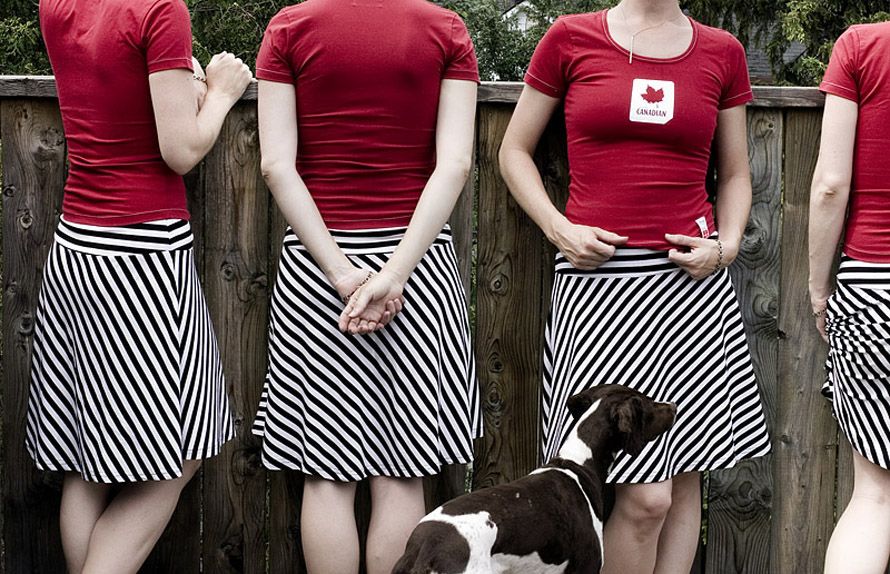Have a question? Need some questionably expert advice? Ignored by everyone else? Send us your questions via email. The Non-Expert handles all subjects and is updated on Fridays, and is written by a member of The Morning News staff.
Question: So, my wife and I left Canada and we visited New York for the very first time in May: loved it. Saw almost everything from Battery Park to Harlem getting around on foot and subway, and of course we were overawed and impressed pretty much constantly. New Yorkers have to be the friendliest, most helpful people ever. Shake out a street map and they flock like moths to a flame to help with directions and sightseeing advice. My question is this: We buy our clothes from the same shops and designers, watch the same TV, listen to N.P.R., and read People and Vanity Fair just like you, so how is that Americans can tell we’re Canadian before we even speak—eh?
Answer: How do we know these things? Decades of intensive, government-funded research and study. Not for nothing did the post-war generation undergo a program of public education that turned them steely-hearted, devout and devoted and eternally wary. When the Pilgrims ventured forth, they could not have imagined the terrible accident of geography that would place the countless generations that followed in constant, mortal peril. For centuries, the horror loomed unseen but keenly felt. Thanks to the bravery and sacrifice of many loyal men and women, only now are we aware of the true extent of the threat. The sordid details have enthralled and terrified generations of kindergarteners for decades now, but the end result is worth it; a discreet, nationwide alert system that maintains unceasing vigilance.
When a committee of high-ranking American and Soviet strategists first identified the Canadian threat, back in the dark days of the 1920s, it was decided that an aggressive policy of appeasement and pacification would be undertaken: keep your friends close but keep your enemies closer. As a nation, we choked but acquiesced to the request, and ensured it was coupled with extreme preventative measures on the home front. It’s little-mentioned today, but the original title of that public information film was Duck and Cover: Canada’s Poised. It was shown on a weekly basis, alongside other long forgotten classics like Massing on the Borders, Stealth, Syrup, and Socialism, and Shun Lumber for a Stronger America. These things are hard to forget. The heart-stopping emergency drills, triggered by sirens with a wheezing, chilling whine, then down to the dark, sweaty recesses of the fallout shelters. Our parents would close their eyes tight and pray they couldn’t detect the sweet, cloying smell of maple syrup that would signal their impending demise. No nation should be able to do that to another. Was it scaremongering? Were we running scared? No, our stance was just plain common sense.
Your every movement creates a gastropodic trail that glistens like a warning beacon to Americans.So don’t mistake the detached, wary suspicion of half a century for friendliness. We know how to play our roles. The tone of your question suggests that this deception works well. People? Vanity Fair? There are no magazines of that name on sale in this city. They are mere fronts, set up in the 1950s by J. Edgar Hoover as a ruse to root out fifth columnists, gaily painted lures that sit on planted newsstands, waiting for Canadians to take the bait. Americans proudly know nothing about N.P.R., for it is merely another painted decoy, designed to spread casual misinformation about the liberal arts. The sick, turgid spiel we pump across your borders is ripe with juicy buzzwords, opinions, concepts, and chit-chat that spills all too eagerly from your lips. All of it is false, stitched together by talented voice artists in vast studio complexes in Arkansas and Mississippi. These highly experienced propagandists are the backbone of the fight. Thanks to them, any wayward talk of jazz, political satire, oenophilia, or pinkish multi-cultural bonhomie goes off in our ears like a jackhammer on the sidewalk, snapping our synapses into instant action. Alerted is forewarned.
And like I say, these ruses work. Your every movement creates a gastropodic trail that glistens like a warning beacon to Americans. The act of simply shaking out a street map is so provocative as to practically constitute a declaration of war. No wonder countless civic-minded citizens rushed to surround you and calmly deflect you from your true intentions. When you get things wrong, it is only by the grace of God and the true grit of the patriot that prevents your instant obliteration. Your pants, for example, might originate from retailers that purport to be related to our popular brands. Here, they are traditionally worn on the legs. Admittedly, the two tubes of material have the makings of an excellent hat, but this then leaves the legs bare. It is only through sheer politeness and gritted determination that we never acknowledge such sartorial transgressions.
So we stay vigilant. We hear the stories. We remember the myths. No American wants to return to a time when a nameless horror, creeping like a thick mist, would push its wet fingers under doors and through keyholes, draped damply across napes and cheeks. The nation’s rich patchwork of urban legends have at their core a kernel of truth. Canada must be stopped, but slowly, gently, and without recourse to a fight we would inevitably lose. That is why the quiet war goes on. No need to open your mouth at all, eh?



